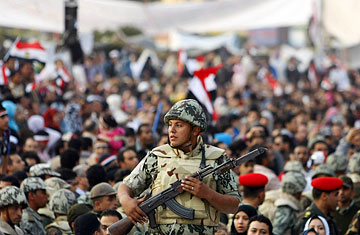
The Egyptian army stands by as people celebrate close to Cairo's Tahrir Square on Feb. 12, 2011
(2 of 2)
Mubarak, mindful of the fact that the institution that had bequeathed him power could just as easily take it away, sought in the 1980s to maintain its loyalty by making the military a major stakeholder in the country's economy. That strategy was evident to U.S. diplomats in the last years of Mubarak's rule, when he was thought to be grooming his son Gamal as a possible successor. A 2008 diplomatic cable from U.S. Ambassador Margaret Scobey, released by WikiLeaks, noted, "The regime, aware of the critical role the MOD [Ministry of Defense] can play in presidential succession, may well be trying to co-opt the military through patronage into accepting Gamal's path to the presidency." Scobey added, "The military helps to ensure regime stability and operates a large network of businesses, as it becomes a 'quasi-commercial' enterprise itself." In neutralizing the Egyptian military's kingmaker abilities though economic incentives, Mubarak was also ensuring that the military would do everything it could to protect those interests.
In fact, the military is so well protected that Egypt's citizens have no access to such basic information as force levels and budgets. Estimates on the percentage of the Egyptian economy controlled by the military range from 30% to 45%, but even those figures are up for debate. "That it is an economic force is certain," says Fawaz Gerges, professor of international relations of the Middle East at the London School of Economics. "But how big, nobody knows. Not the U.S., and not even the World Bank," which once tried, and failed, to get the army to privatize some of its assets. "The Egyptian army is more involved in the economy than the Chinese army is involved in its own economy," says Gerges. "The army's intentions are good, but when the chips are down, good intentions will bow before the vested interests."
A transition to a full-blown democracy may seem too risky for a military leadership that doesn't want to see precipitous change. Both Field Marshal Mohamed Hussein Tantawi, Egypt's Defense Minister and the man at the head of the ruling Supreme Council, and Lieut. General Sami Hafez Enan, military chief of staff, are vestiges of the old regime. "Tantawi is as conservative as Mubarak, and he doesn't believe in economic or structural change," says Gerges. "He doesn't believe that Egyptians are ready for democracy."
It remains to be seen whether the Egyptians who overthrew Mubarak will accept the terms for a political transition outlined by the military. Newspaper publisher Hisham Kassem believes that the army will be true to its word, if not exactly true to the spirit of the democratic rebellion. "We will see a transition to democracy this year. But it will take five to 10 years before we see a democratically elected civilian government command the military."
For the moment, that is enough for some protesters. "I know the army respects Egyptians because they did not fire on us in the square," says 18-year-old student Rania Magdy. "They want what is good for the Egyptian people." But who decides what is good for the Egyptian people remains to be determined in the coming months.
